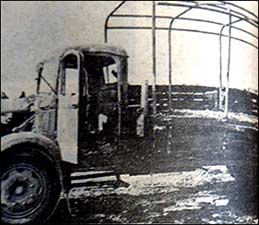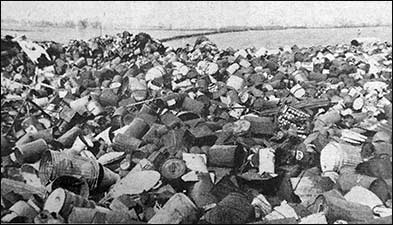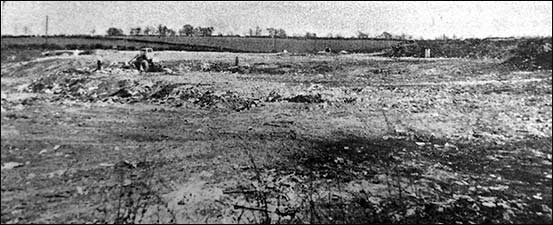The Rushden Echo, 3rd May 1963, transcribed by Jim Hollis
Few Want To Become Dustmen
Ever since Lonnie Donegan recorded “My Old Man’s a Dustman”, Rushden health department has found it extremely difficult to recruit new refuse collectors.
Mr. Harold Ingham, who is in charge of the refuse disposal department, told the “Echo” that young men particularly had fought shy of becoming dustmen. This was because their girlfriends would laugh when they thought of the song.
However, refuse disposal, it seems, is a more serious business than Mr. Donegan would have us believe.
 |
 |
|
Burnt out lorry last Friday at the tip
|
Tin cans at the tip
|
1,800 Bins
Dr. Beeching’s “Filthy Public” at Rushden fill 1,800 bins a day, which together with waste from the shoe factories, can add up to a sizeable tonnage.
At the tip in Bedford Road, Rushden’s rendezvous for the rubbish, the council operates what is known as “controlled tipping.” Each day’s refuse is neatly laid out six feet deep and is then covered with a layer of soil.
 |
|
8,400 bins are emptied here each week
|
Heat generated by damp rubbish can reach very high temperatures. The soil forms a “pocket of rubbish” which if it does happen to catch fire, cannot spread throughout the tip.
This method of dispensing with old rubbish – according to the historians – was first proved successful at the turn of the century.
Changes
Changes in heating systems have brought to light an interesting fact for those whose business necessitates a trip to the Bedford Road site.
Several decades ago the rubbish would consist almost entirely of clinkers and coke. Nowadays the bulk of it is fine dust from all-night burners, in addition, of course, to polythene bags, tin cans and cardboard.
The tip has been in existence for twenty years and it has less than three years’ capacity left.
|
The Rushden Echo, 3rd May 1963, transcribed by Jim Hollis
Council seeks expert advice
Rushden Urban Council on Monday decided to seek expert advice in connection with trade effluents discharged into the public sewers. The initial total cost will be not more than £150.
The Public Health Committee reported that it had been discussing arrangements for the expert, Mr. A. Sciver, to spend two days in the district investigating the most important trade effluents and analysing samples.
At the committee’s meeting last November the clerk pointed out that trade effluents discharged into the sewers could be controlled under additional powers available to the council, and that some loss of revenue would result from a delay in imposing charges.
The council learned on Monday that Mr. Sciver had specified his fee per day for professional service, and the charges for analysing trade effluents, but he had been unable to state what the total cost would be.
Frost Damage
The council approved the committee’s decision that the total cost should not exceed £150 without further authorisation.
The council authorised the surveyor to serve accounts on four tenants for any part of the costs not recoverable under the council’s insurance policy in respect of frost damage to water systems resulting from negligence.
The gross cost of the repairs was said to be £49 4s 6d.
The Highways and Planning Committee reported that no satisfactory response had been received to advertisements for a street mason/pavior.
The housing committee was to be asked if it could offer housing accommodation in the event of it being possible to fill the vacancy from outside the district.
The clerk, the treasurer and the surveyor were authorised to attend a conference on “Productivity for Local Government” at Peterborough on July 4.
|
The Rushden Echo, 7th June 1963, transcribed by Jim Hollis
Problem of refuse
Rushden Urban Council’s Public Health Committee, which recently visited refuse disposal plants at Aireborough and Leatherhead, has asked its surveyor to report on the probable life-span of the Bedford Road refuse tip.
Committee members told the council at its present meeting that it had been decided not to give further consideration to methods of dealing with refuse as it was dealt with at Leatherhead – by means of a composting plant.
The surveyor, while having been asked to submit his observations on the refuse tip, had also been asked to report on the alternative method of providing a modern incineration plant like that seen at Aireborough.
Mr. J. E. Wills, however, asked why the committee had “turned its backs” on a composting plant. He had read in a newspaper (a Conservative one, he quipped) that Leicester City Council was to install one and was intending to sell the compost at 15s to £1 a ton.
Mr. R. H. S. Greenwood said he had visited the Leatherhead plant, and he would not ask anyone to work “in the smell that we experienced.”
Mrs. A. Perkins, chairman of the Public Health Committee, endorsed Mr. Greenwood’s remarks, and said she was pleased to see the extended use of the refuse tip was being investigated. A further ten years’ use would mean “a terrific saving.”
Mr. Cyril Freeman, chairman of the council, said an important consideration had been the cost. The annual maintenance costs for a composting plant were over £2,000 a year.
|
The Rushden Echo, 6th March 1964, transcribed by Jim Hollis
Dogs To Stop Thieves - Canine ‘night watchmen’ plan for Rushden
Will guard dogs help put a stop to Rushden’s appalling record of thieves breaking into local premises?
One man who believes they will – Mr. Derek Law, 36 Tennyson Road – is advertising for “big, bold Alsatians,” in the hope that local businessmen and shopkeepers will use them to deter would-be criminals from breaking into their premises.
This step is being taken in an attempt to prevent the rapidly increasing number of thefts in the town from reaching bigger proportions.
Twelve months ago a figure of £10,000 was recorded to cover the amount stolen from shops, garages and factories at Rushden for the previous four months.
Now the figure is considerably higher.
Record
At the weekend the spate of thefts reached a record number when five separate premises were entered – including one at a High Street shop which had been broken into three times in the past few months.
Mr. Law’s intention is to prevent these crimes – admittedly minor ones compared with other big cities, but nevertheless a big worry for local people.
The dogs would be posted on the premises, especially those which are in quieter parts of the town.
They would assume the role of night-watchmen and act as a deterrent for prowlers. Their barking on hearing anything suspicious would attract the attention of patrolling policemen.
In an effort to call shopkeepers’ attention to the urgent need to be security minded and take all possible precautions to stamp out the current crime wave, those whose premises have been found with insecure doors or windowsare being warned by notices from the Northamptonshire Constabulary.
They also inform the person concerned that a patrolling officer examined the premises to find either a light or fire left on where this is not normal.
They added: “Not only did the inquiries into these matters cause much time to be unnecessarily wasted, but it is very much in your own interest to make quite sure that criminals do not have things made too easy for them by affording a simple entry into your premises through an insecure door or window.”
Normal
Those distributed in Rushden are signed by Inspector A. Watkin, who told the “Echo”: “This is normal procedure. We hope they make people realise what the policeman on duty has found, so that it does not happen again.”
This scheme, mooted by the Chief Constable, applies to the whole county, and Rushden people, it seems, need to take particular note of any lapses in their awareness of the part they must play in crime prevention.
|
The Rushden Echo, 13th March 1964, transcribed by Jim Hollis
Changing face of Rushden’s High Street - Seven Empty Shop Premises
The percentage of empty shops in Rushden’s town centre is high compared with that of towns like Wellingborough and Kettering.
A quick count shows that there are at least seven unused premises in and around the High Street, but changes have been taking place recently which could reduce this number and add to the shopping facilities.
Several established shop owners have decided to expand their businesses and have taken over some of the vacant premises.
The tailoring firm of E. Abington and Sons Ltd. has taken over the premises formerly run by florist Bernard Palmer. The hoardings went up this week as workmen began the job of converting the shop.
The Singer Sewing Machine Co. Ltd. another of the town’s established firms, is almost ready to transfer its business from Church Street to new premises on the corner of High Street and Queen Street.
The firm hopes to be ready for business at High Street today. The future of the old shop is not certain.
A spokesman for the owner said several inquiries had been received but no agreements had been reached because Singer had powers to re-let if they wished.
Local Florist
It is understood that a local florist is interested in acquiring Abington’s old premises to expand trade.
The corner shop at the junction of High Street and Church Street, which until lately was run as a chemist’s shop by Mr. G. E. V. Fleeman, is to become part of Fairey Bros. ironmongers, whose premises are next door. Modernisation is soon to be started and it is hoped that the shop will be ready for business in July or August.
The future of what used to be Elizabeth’s millinery shop and Cutmore’s cycle shop is unknown. Rushden Co-operative Society, the owners, declined to comment on their future use.
This leaves Willmott’s grocery store, which has been to let for at least six months, and the grocery store next to the Wesleyan Church, for which, it appears, there are no immediate plans.
The latest shop to fall vacant, that of S. F. Webb, leather and sports goods dealer, is being offered for auction shortly.
|
The Rushden Echo, 3rd April 1964, transcribed by Jim Hollis
£60 a square yard for Webb’s
Rising Cost of High St. Property
The sale of the former leather goods shop of S. F. Webb in High Street, Rushden, for £7,650 is a valid pointer to the future cost of property in the High Street.
With a frontage of 13 feet, the shop covers an area of 130 square yards. Last week’s buyer therefore thought it worth paying about £60 a square yard for the premises.
It was interesting to note at the sale that few people were interested in buying the property, preferring to confine their interest in the price for which it went.
Estate agents estimated that Webb’s shop would sell for around £5,000, but added: “Anything could happen. You never know what will happen with property, especially in a place like Rushden, where there has not been an auction sale of property on the High Street for a long time.”
On the fifteenth of this month a redevelopment site, 147 to 153 High Street, covering 5,750 square yards, comes up for sale by auction. The site will be sold in two lots, 147 and 149 to 153.
Taking £60 per square yard as a pointer, this site could sell for as much as £345,000.
Estate agents agreed that this price would be quite unreasonable, but it is an interesting comparison.
Jokingly, it has been suggested that the combined premises of the High Street would sell for this amount.
Agents also admit that Webb’s fetched “a very good price for its size,” but are unwilling to give a possible price for the redevelopment site. Nor are figures available for comparison with the cost of similar property in other towns.
Interest
They do say that a lot of interest has been shown in the property in Rushden, with many people asking to view it: “Its cost will depend on the demand at the time.” The price we mention is fantastic. This is clearly seen when compared with the cost of Overstone Solarium, which was sold at the end of last year. This Northamptonshire beauty spot, which covers about 107 acres, was auctioned for £164,000
The Rushden redevelopment site, zoned for shops and offices in the town map, covers just over one acre.
Rushden Council’s surveyor, Mr. W. J. Anker, emphasises that planning permission would be far more readily granted for shops and offices than for industrial premises.
Difficulty
He foresees the added difficulty of providing adequate car parking space in the town as development proceeds.
“We have got to look into the future as far as car parking is concerned. For the moment the town is adequately provided for, but as development proceeds they are going to be swallowed up.”
It would be fair, he thought, to ask prospective developers in the town to provide parking space for their staff, leaving public car parks free for customers.
|
The Rushden Echo, 29th May 1964, transcribed by Jim Hollis
Police Call For Help
Another break-in at a Rushden garage on Sunday has brought the number of unsolved crimes in the Rushden area to nine since the beginning of this month.
Six of the offences occurred in Rushden and the remaining three at Irthlingborough. They involved something like £200 in cash and probably nearly half that amount in property.
None has the characteristics of professional jobs, said a police spokesman. Nor are there any obvious connections between them or a regular pattern.
It is a situation which is giving rise to some concern in certain quarters, although it has not yet assumed the proportions of a “crime wave”.
It was not unusual, added the spokesman, for there to be this many unsolved break-ins in a month. The month began with a smash and grab raid on a wine shop at Rushden. It netted £20 worth of Scotch whisky for the thieves.
It progressed at the rate of one break-in every four days or so, by way of a Rushden hairdressers, where cigarettes and cash were taken, an Irthlingborough shoe factory (nothing taken), and Irthlingborough Working Men’s Club (cash and cigarettes again), until May 16.
From then on the frequency dropped to every two or three nights; although in some cases it was every night.
Rushden Bowls Club was entered and £10 taken from a smashed fruit machine. The next night £40 in cash was taken from a factory canteen at Irthlingborough.
This was followed two nights later by the safe-breaking at Rushden Trades Club. This was the “five-star” job of the month. It yielded £100 in cash from the safe.
The urban council bowls pavilion was next on the list; and two nights later by the safe-cracking at a Rushden garage, but apart from taking a look around, it is thought the intruder left empty-handed.
Rushden police appealed through the “Echo” for any member of the public who can give any information on these crimes to come forward and help.
These petty offences – for compared with professional jobs that is what they are – are the hardest to solve. Often there is every chance of the thief getting clean away.
|
|